With an Autistic host and all Autistic guests, our podcast aims to amplify Autistic voices from a diverse range of backgrounds, with Australian and international Autistic advocates sharing their stories and perspectives from lived experience.
Scroll down to listen below, where you’ll also find the transcripts for each podcast.
You will also find the episodes on Apple Podcasts, Spotify and other favourite apps.
Listen online:
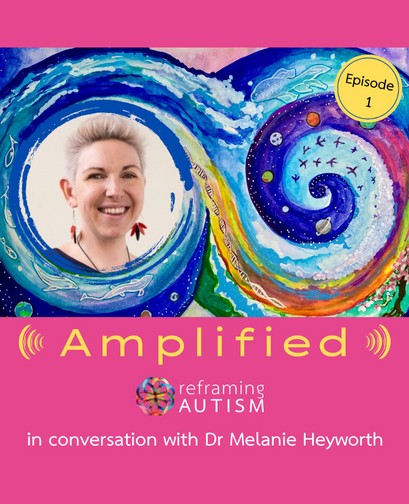
In this first episode Ginny Grant begins by introducing the show and providing context about herself and Reframing Autism. Ginny then introduces Dr Melanie Heyworth, who is an Australian Autistic woman, a self- and systemic advocate for the Autistic community, Reframing Autism’s founder and CEO, a PhD candidate, and proud mother and educator to her three Autistic children.
In their conversation, Melanie reflects on her late identification as Autistic, and how that led her to a growing interest in advocacy. Melanie also discusses the evolution of Reframing Autism from a small passion project to the busy not-for-profit organisation it has become. She talks about her hopes for the future, that there will be no need to ‘reframe Autism’, that Autism will have been ‘reframed’, and that Autistic culture and identity are recognised as valuable contributors to the richness of humanity. Melanie also summarises her current research into Autistic-led models of care to support families to understand their children’s neurology. And finally, she discusses the challenges of balancing work, study, and parenthood, and how her hyperfocus and passion for learning spur her on.
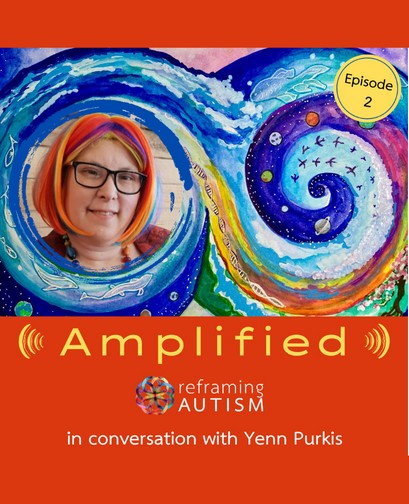
In this second episode Ginny Grant begins by introducing the show and providing context about herself and Reframing Autism. Ginny then introduces Yenn Purkis, who is an Autistic and non-binary advocate, presenter, and author and co-author of 10 books. Yenn’s advocacy work began in 2005, and since that time they have been prolific, producing memes, blogs, videos, and undertaking many speaking engagements.
In the conversation, Yenn reflects on their diagnosis during their twenties and the fact it took quite some time to accept their Autistic identity. Yenn also discusses what spurred on their journey as an advocate and reflects on some of their achievements. Yenn talks about their writing career, including what motivated them to start writing books, and explores some of their recent and upcoming titles. Yenn also reveals some of their aspirations and hopes for the Autistic community. And finally, they discuss some of their strategies for mental health and wellbeing.
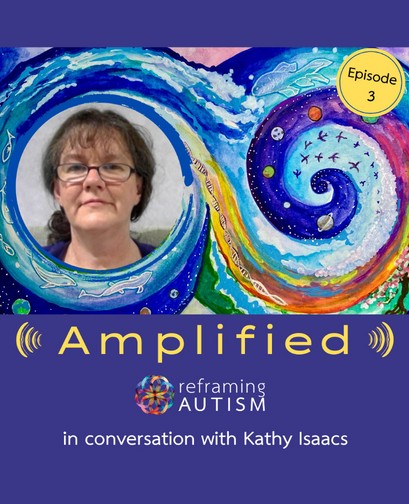
In this third episode Ginny Grant begins by introducing the show and providing context about herself and Reframing Autism. Ginny introduces Kathy Isaacs, who is an Autistic advocate and activist. Kathy is Reframing Autism’s chairperson and also a director of the charity, The Autistic Realm Australia, or TARA, which facilitates connections and education through Autistic people. Previously, Kathy was the chair of the Autistic Self Advocacy Network of Australia and New Zealand.
In the conversation, Kathy reflects on her late diagnosis, having discovered her Autistic identity while reading about Autism. Kathy discusses what encouraged her to become involved in Autism advocacy and activism and what continues to drive her work in these areas. Kathy also talks about her work with TARA in providing peer support to Autistic adults and children through its various online communities. Finally, Kathy discusses her work as a palliative care nurse. She reflects on what drew her to that work and also her role in helping Autistic people in accessing the healthcare system.
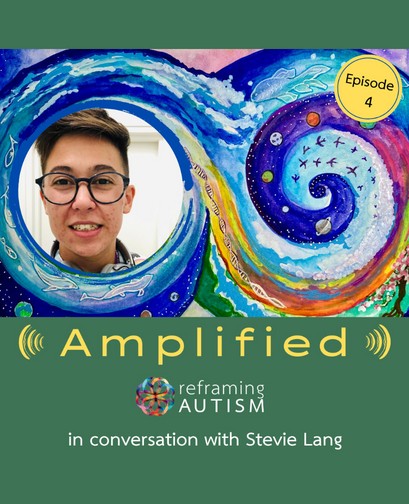
In this fourth episode Ginny Grant begins by introducing the show and providing context about herself and Reframing Autism. Ginny introduces Stevie Lang, who is an Autistic trans advocate and writer. Stevie writes about Autism, gender, sexuality and relationships. They have a large, engaged Instagram following at their account @_steviewrites.
In the conversation, Stevie reflects on their late diagnosis, having discovered their Autistic identity at 28 while reading about Autism. Stevie discusses how they became involved in education and advocacy around disability and sexuality and what continues to drive their work in this. Stevie also talks about accepting their Autistic identity, their PhD, and their deep interests in relationships and queer theory. Finally, Stevie discusses their transgender expression and experience.
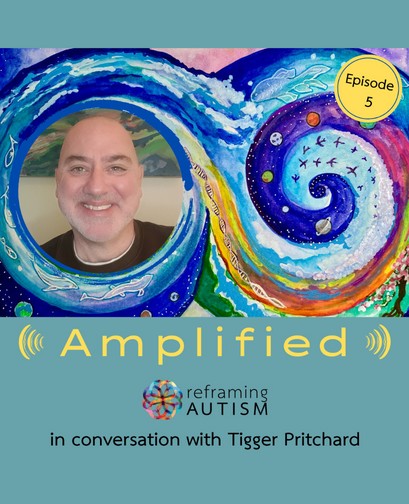
In this fifth episode Ginny Grant begins by introducing the show and providing context about herself and Reframing Autism. Ginny introduces Tigger Pritchard, who is an Autistic advocate, trainer and consultant.
Tigger has devoted the past thirty years to working with neurodivergent individuals in many capacities. He consults to individuals, families and organisations, sharing his extensive skills, knowledge and lived experience. Tigger is the longest-serving Makaton (keyword sign) tutor in the United Kingdom. He’s also involved with the National Autistic Society in the county of Cornwall. And he runs the Facebook page The Autistic Coffee Shop with Tigger Pritchard, as well as an Instagram account and YouTube channel.
In the conversation, Tigger reflects on his late identification, having only discovered his Autistic identity at the age of 55. Tigger discusses his deep passion for “the world of Autism”. Tigger also talks about the pathological demand avoidance profile (PDA), how it presents and how it is frequently misunderstood. Finally, Tigger discusses his volunteer role with the National Autistic Society in Cornwall and his broader advocacy work. He talks about what drives his advocacy, including his passion for reframing the narrative around Autism and PDA.
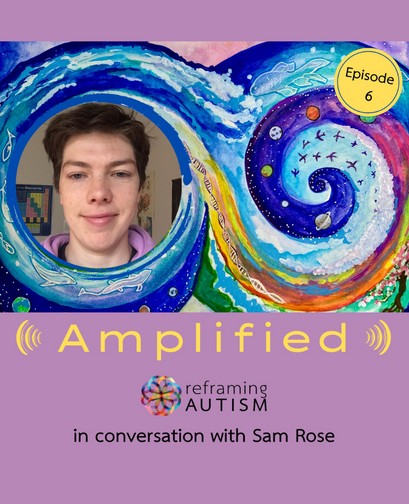
In this sixth episode Ginny Grant begins by introducing the show and providing context about herself and Reframing Autism. Ginny introduces Sam Rose, who is an Autistic advocate, mentor and student.
Sam is a program facilitator, mentoring Autistic youth with the I CAN Network. Sam is soon to complete a Bachelor of Arts/Psychology where they have been developing academic interest in the intersection of Autism and mental health, and the concept of neurodiversity more broadly. As a member of the Queer community, Sam is also interested in working at the intersection of Autistic LGBTIQA+ identity and unpacking internalised stigma, and they have co-authored a book, “The Awesome Autistic Guide for Trans Teens,” on this topic with Yenn Purkis.
In the conversation, Sam reflects on their late Autistic identification in their early twenties. Sam discusses some of the barriers to finding and embracing an Autistic identity and what Autistic empowerment looks like. Sam talks about their deep passion for Autism, and also their strong interest in gardening and being in nature. Sam also talks about their rewarding work with the I CAN Network, connecting with young Autistic people. Finally, they chat about their drive to reduce stigma and increase understanding of the intersections between Autism and mental health issues as well as gender and sexuality.
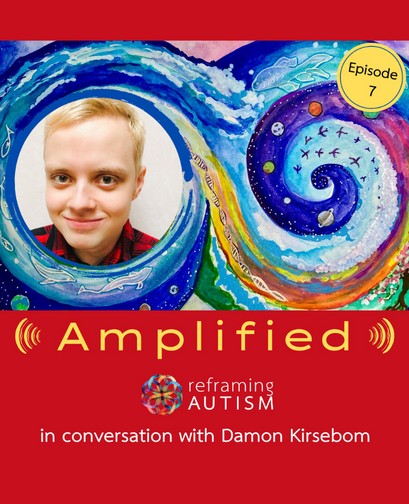
In this seventh episode Ginny Grant begins by introducing the show and providing context about herself and Reframing Autism. Ginny then introduces Damon Kirsebom, who is a young Canadian nonspeaking Autistic advocate.
In the conversation, Damon reflects on his journey from not having a reliable form of communication throughout his younger years to learning to communicate via a letterboard, then an iPad at the age of fourteen. He discusses his experiences of segregation, discrimination and isolation in high school and how these led him to develop an interest in advocacy. He also discusses some of the videos he created, sharing his experiences and insights to help others understand other nonspeaking Autistic people and improve the lives of nonspeakers.
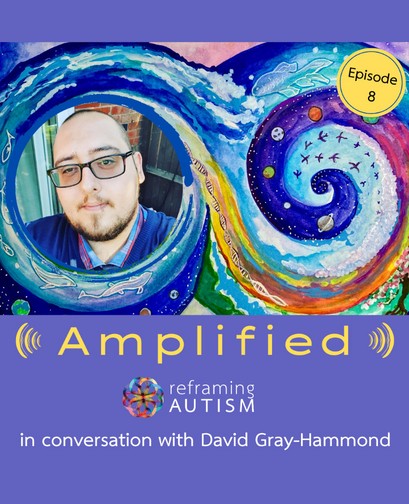
In this eighth episode Ginny Grant begins by introducing the show and providing context about herself and Reframing Autism. Ginny then introduces David Gray-Hammond, who is an Autistic mental health and addiction advocate and activist.
In the conversation, David reflects on his journey of Autism acceptance after receiving a diagnosis at the age of twenty-six. He discusses his first steps into the world of advocacy and how he discovered the support and embrace of the Autistic community which has been vital to his wellbeing. He also discusses what prompted him to begin writing his blog about Autism, mental health and addiction (Emergent Divergence) and what drives him to keep writing and advocating in these areas. David also explores some of his proudest moments as an advocate and activist to date and shares his hopes for the future.
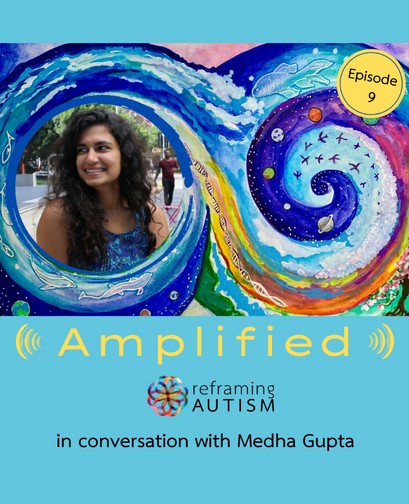
In this ninth episode Ginny Grant begins by introducing the show and providing context about herself and Reframing Autism. Ginny then introduces Medha Gupta, who is a young Australian Autistic advocate.
In the conversation, Medha reflects on her journey of Autism acceptance after receiving a diagnosis at the age of twenty-one. She discusses how she connected with the neurodivergent community online and face to face and the important role this had in her understanding of her identity. She discusses some of the ways in which she has contributed to the Sydney Autism Lions Club and her advocacy more broadly, including her 2021 presentation “Flourishing in Otherness” for Reframing Autism. Finally Medha gives some important advice for Autistic students seeking a tertiary education.
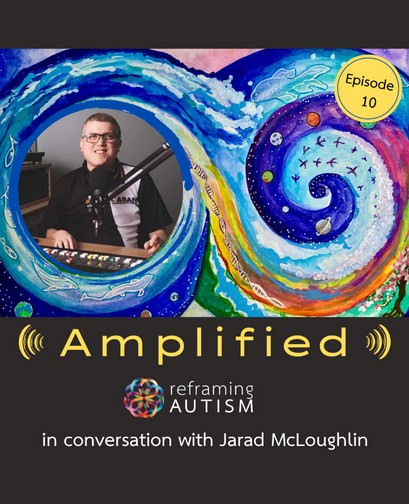
In this tenth episode Ginny Grant begins by introducing the show and providing context about herself and Reframing Autism. Ginny then introduces Jarad McLoughlin, who is an Australian Autistic LGBTQIA+ and disability advocate and activist.
In the conversation, Jarad reflects on his Autism journey after receiving a diagnosis as a young child. He discusses some of the barriers to understanding and accepting Autism at that time, including the lack of information, resources and role models. He talks about how he finally came to accept and embrace his Autism in his teenage years along with being part of the LGBTQIA+ community. Jarad discusses his contributions to several not-for-profit organisations, such as the Autistic Self Advocacy Network and People with Disability Australia. Finally he shares two of his proudest moments as an advocate.
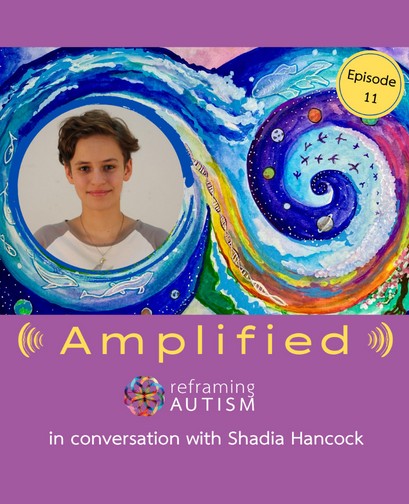
In this eleventh episode Ginny Grant begins by introducing the show and providing context about herself and Reframing Autism. Ginny then introduces Shadia Hancock, who is a young Australian Autistic advocate.
In the conversation, Shadia reflects on their Autism journey after learning of their Autistic identity at eight years of age. Shadia explains that they were connected in with older Autistic mentors early in their journey, which helped to foster a positive sense of identity. Shadia discusses their initial steps in advocacy, beginning with a presentation to their teachers about their Autistic identity, their differences and needs. They also reflect on their experience of travelling to Singapore for the Asia Pacific Autism Conference in 2019, which was a proud achievement for them. Shadia explores their experience of studying Speech Pathology at university, including some of the barriers they have faced and their tips for new Autistic students. Finally, they discuss their future career aspirations, including doing further research into supporting AAC users and providing animal-assisted therapy through their practice.
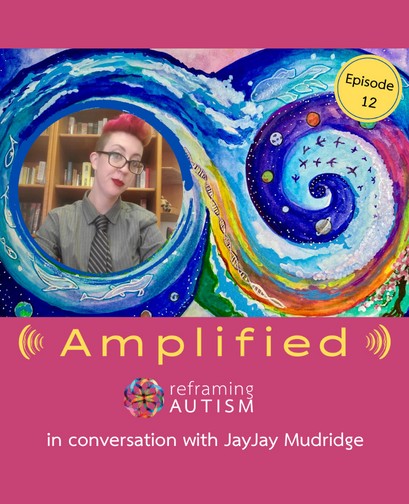
In this twelfth episode Ginny Grant begins by introducing the show and providing context about herself and Reframing Autism. Ginny then introduces JayJay Mudridge, who is a young American Autistic advocate.
In the conversation, JayJay reflects on their Autism journey after being identified as Autistic at a young age. They talk about how finding the Autistic community and seeing Autistic individuals existing as their authentic selves was a vital step in their own self-acceptance. JayJay discusses some of the Autistic advocates they have become friends with and how those relationships work. Next, They explain that their advocacy was traumagenic – that is, it comes from a place of trauma – following their experiences of Applied Behaviour Analysis or ABA during their formative years. JayJay shares some of their experiences of ABA and its devastating impacts, and comments on the notion of “modern ABA”. Finally, JayJay explores some of the ways in which they have unmasked and live authentically.

The Reframing Autism team would like to acknowledge the Traditional Owners of the lands on which we have the privilege to learn, work, and grow. Whilst we gather on many different parts of this Country, the RA team walk on the land of the Awabakal, Birpai, Whadjak, and Wiradjuri peoples.
We are committed to honouring the rich culture of the Aboriginal and Torres Strait Islander peoples of this Country, and the diversity and learning opportunities with which they provide us. We extend our gratitude and respect to all Aboriginal and Torres Strait Islander peoples, and to all Elders past and present, for their wisdom, their resilience, and for helping this Country to heal.